范耀天:国际海事公约动态资料
范耀天:国际海事公约动态
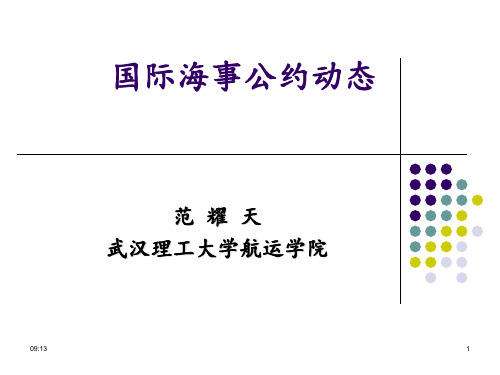
15:59
6
3、联合国海洋法公约
1973年 12月,第三次海洋法会议在纽约开幕,该次会议历时 9年,终于 于 1982 年在牙买加会议上通过了《联合国海洋法公约》。于 1994 年 11 月 16日正式生效。我国于1996年5月15日批准《公约》。交存批准书后第30 天起对我国生效。
15:59
1966年国际载重线公约 (LL 1966)
1978年船员培训、发证和值班标准国际公约 STCW 1978
1971年特种业务客船协定 (STP 1971) A
1979年国际海上搜寻救助公约 (SAR1979)
海上安全
15:59
14
4.1 涉及海上安全的国际公约
Convention for the Suppression of Unlawful Acts Against the Safety of Maritime Navigation (SUA 1988), and Protocol for the Suppression of Unlawful Acts Against the Safety of Fixed Platforms located on the Continental Shelf (and the 2005 Protocols)《1988年抑止有害航海安全的非法行为公约》及《制止对大 陆架固定平台安全的非法行为议定书》 Convention on the International Maritime Satellite Organization ( IMSOC 1976) The Torremolinos International Convention for the Safety of Fishing Vessels (SFV 1977), superseded by the The 1993 Torremolinos Protocol International Convention on Standards of Training, Certification and Watchkeeping for Fishing Vessel Personnel (STCW-F 公约
航运国际公约和国内法规

航运国际公约和国内 法规公约 • 国内法规 • 航运安全管理体系 • 航运安全管理措施 • 航运事故处理与法律责任
01
国际公约
《联合国海洋法公约》
总结词
规定了各国在海洋上的权利和义务,包括航行自由、海洋资源利用、海洋科学 研究以及海洋环境保护等。
详细描述
该公约确立了领海、专属经济区和公海等概念,明确了各国在海洋上的主权和 管辖权。同时,公约还规定了各国在海洋科学研究、海洋环境保护等方面的义 务和权利。
《中华人民共和国船舶安全监督规则》
总结词
该规则规定了船舶安全监督的程序、标 准和要求,旨在提高船舶安全水平,保 障人命财产安全。
VS
详细描述
该规则对船舶的建造、检验、维修保养等 方面进行了规范,要求船舶必须符合国家 有关安全标准,并接受国家安全监督检查 。同时,该规则还规定了船舶安全事故的 调查和处理程序,为提高船舶安全水平提 供了有力保障。
航运安全管理体系的审核与发证
审核机构与审核程序
01
选择具有权威性和专业性的审核机构,制定详细的审核程序,
确保审核工作的公正、客观和准确。
审核内容与标准
02
根据国际公约和国内法规要求,制定详细的审核内容和标准,
确保航运安全管理体系符合相关要求。
发证与换证
03
对于符合要求的航运企业,颁发安全管理证书,并定期进行换
《国际海上人命安全公约》
总结词
旨在保障海上人命安全,规定了船舶构造、设备、操作等方面的最低安全标准。
详细描述
该公约对船舶的构造、救生设备、消防设备等方面做出了详细规定,要求船舶必 须符合规定的标准,以确保在海上遭遇紧急情况时能够最大限度地保障人命安全 。
国际海事组织颁布公约一览表
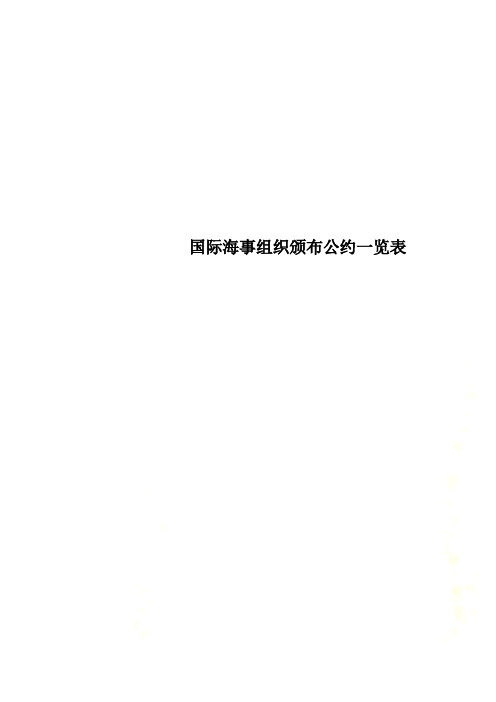
国际海事组织颁布公约一览表国际海事组织颁布公约一览表1、1974年国际海上人命安全公约(Internation Convention for the Safety of Life at Sea, 1974, 修正于1974年(SOLAS)) 1980年5月25日2、1974年国际海上人命安全公约1978年议定书(SOLAS PROT (amended) 1978)1981年5月1日3、1974年国际海上人命安全公约1988年议定书(SOLAS PROT ( (HSSC) 1988)2002年02月03日4、1972年国际海上避碰规则公约(Convention on the International Regulations for Preventing Collisions at Sea, 1972, as amended (COLREGS (amended) 1972)5、1973年国际防止船舶污染公约(International Convention for the Prevention of Pollution from Ships, 1973 as modified by the Protocol of 1978 thereto (MARPOL (amended) 71/78))1983年10月2日6、1965年国际便利海上运输公约(Convention on Facilitation of International Maritime Traffic, 1965, as amended (FAL (amended) 1965))1967年3月5日7、1966年国际载重线公约(International Convention on Load Lines, 1966 (LL 1966))1968年7月21日8、1966年国际载重线公约1988年议定书(LL PROT (HSSC) 1988)2005年01月01日9、1969年国际船舶吨位丈量公约(International Convention on Tonnage Measurement of Ships, 1969 (TONNAGE 1969))1982年7月18日10、1969年国际干预公海油污事件公约(International Convention relating to Intervention on the High Seas in Cases of Oil Pollution Casualties, 1969 (INTERVENTION 1969))1975年5月6日11、1973年国际干预公海非油污类物质污染议定书(Protocol relating to Intervention on the High Seas in Cases of Pollution by substances other than Oil, 1973, as amended (INTERVENTION PROT (amended) 1973 ) 1983年3月30日12、1969年国际油污损害民事责任公约(International Convention on Civil Liability for Oil Pollution Damage, 1969 (CLC 1969))1975年6月19日13、1969年国际油污损害民事责任公约1976年议定书(CLC PROT 1976)1981年4月8日14、1969年国际油污损害民事责任公约1992年议定书(CLC PORT 1992)1996年5月30日15、1971年特种业务客船协定(Special Trade Passenger Ships Agreement, 1971 (STP 1971))1974年1月2日16、1973年特种业务客船舱室要求议定书(Protocol on Space Requirements for Special Trade Passenger Ships, 1973 (SPACESTP 1973))1977年6月2日17、1971年核材料运输民事责任公约(Convention relating to Civil Liability in the Field of Maritime Carriage of Nuclear Material, 1971 (NUCLEAR 1971))1975年7月15日18、1971年关于设立国际油污损害赔偿基金国际公约(International Convention on the Establishment of an International Fund for Compensation for Oil Pollution Damage, 1971 (FUND 1971))1978年10月16日19、1971年关于设立国际油污损害赔偿基金国际公约1976年议定书(FUND PROT 1976)1994年11月22日20、1971年关于设立国际油污损害赔偿基金国际公约1992年议定书(FUND PROT 1992)1996年5月30日21、1972年国际集装箱安全公约(International Convention for Safe Container, 1972, as amended (CSC (amended) 1972))1977年9月6日22、1974年海运旅客及行李雅典公约(Athens Convention relating to the Carriage of Passengers and their Luggage by Sea, 1974 (PAL 1976))1987年4月28日23、1974年海运旅客及行李雅典公约1976年议定书(PALPORT 1976)1989年4月30日24、1974年海运旅客及行李雅典公约1990年议定书(PAL PORT 1990)尚未生效25、国际海事卫星组织公约(Convention on the International Maritime Satellite Organization (INMARSAT), as amended (INMARSAT C (amended)) 1979年7月16日26、国际海事卫星组织业务协定(Operating Agreement on the International Maritime Satellite Organization (INMARSAT), as amended (INMARSAT OA (amended)) 1979年7月16日27、1976年海事索赔责任限制公约(Convention on Limitation of Liability for Maritime Claims, 1976 (LLMC 1976))1986年12月1日28、1976年海事索赔责任限制公约1996年议定书(LLMC PROT 1996)尚未生效29、1977年国际捕鱼船安全Torremolinos公约1993年Torremolinos 议定书(SFV PROT 1993)尚未生效30、1978年海员培训、发证和值班标准国际公约(International Convention on Standards of Training, Certification and Watchkeeping for Seafarers, 1978, as amended (STCW (amended) 1978))1984年4月28日31、1995年捕鱼船职员培训、发证和值班标准国际公约(International Convention on Standards of Training, Certification and Watchkeeping for Fishing Vessel Personnel, 1995(STCW-F))尚未生效32、1979年国际海上搜寻救助公约(International Convention onMaritime Search and Rescue, 1979 (SAR 1979))1985年6月22日33、1988年制止危及海上航行安全非法行为公约(Convention for the suppression of Unlawful Acts against the Safety of Maritime Navigation (SUA 1988))1992年3月1日34、1988年制止危及海上航行安全非法行为公约议定书(SUA PROT 1988)1992年3月1日35、1989年国际救助公约(International Convention on Salvage, 1989 (SALVAGE 1989))1996年7月14日36、1990年国际油污防备、反应和合作公约(International Convention on Oil Pollution Preparedness, Response and Co-operation, 1990 (OPRC 1990))1995年5月13日37、1996年关于与危险品及有毒物品海上运输相关的责任及损害赔偿国际公约(International Convention on Liability and Compensation for Damage in connection with the Carriage of Hazardous and Noxious Substances by Sea, 1996 (HNS 1996))尚未生效38、1993年海上留置权和抵押权国际公约(International Convention on Maritime Liens and Mortgages, 1993, 于UN/IMO 代表大会上通过)尚未生效39、1972年防止倾倒废料及其他物质污染海洋公约(Convention on the Prevention of Marine Pollution by Dumping of Wastes andOther Matter, 1972, as amended (LC (amended) 1972))1975年8月30日。
联合国有关航运的公约

联合国有关航运的公约第一章:导言航运是全球贸易和人类交流的重要方式,为各国经济繁荣和社会发展提供了重要支持。
为了确保航运的安全、高效和可持续发展,联合国制定了一系列有关航运的公约。
第二章:国际海事组织公约国际海事组织(IMO)公约是联合国颁布的关于船舶安全、海洋环境保护和航运管理的重要法律文件。
该公约规定了船舶建造和操作的标准,确保船舶和船员的安全,同时保护海洋环境。
第三章:国际海事劳工公约国际海事劳工公约旨在保护海员的权益和福利,确保他们在船舶上的工作条件符合国际标准。
该公约规定了海员的工作时间、休息和假期等权益,同时保障他们的社会保障和医疗保健。
第四章:国际反海盗公约海盗活动对航运安全和全球贸易造成了严重威胁。
为了打击海盗行为,保护船舶和船员的安全,联合国制定了国际反海盗公约。
该公约要求各国合作,加强海上巡逻和安全合作,追究海盗的责任。
第五章:国际船舶污染公约船舶排放和船舶事故造成的海洋污染严重危害海洋生态和人类健康。
为了保护海洋环境,联合国制定了国际船舶污染公约。
该公约规定了船舶排放的标准和控制措施,同时要求各国加强对船舶事故的应急响应和处置能力。
第六章:国际航道公约航道的畅通对航运的安全和效率至关重要。
为了保障航道的安全和通航自由,联合国制定了国际航道公约。
该公约要求各国合作,共同维护和管理国际航道,确保船舶的安全通行。
第七章:国际海事仲裁公约海事争端的解决对于航运的稳定和可持续发展至关重要。
为了解决海事争端,联合国制定了国际海事仲裁公约。
该公约建立了国际海事仲裁机构,为各方提供公正、有效和高效的争端解决途径。
总结:联合国有关航运的公约涵盖了船舶安全、海洋环境保护、航运管理和海事争端解决等多个方面。
这些公约的实施和遵守,对于保障航运的安全和可持续发展具有重要意义。
各国应加强合作,共同推动航运行业的发展,为全球贸易和人类交流提供更好的支持。
通过联合国公约的落实,我们可以确保航运行业更加安全、高效和环保,为人类社会的繁荣和发展做出贡献。
关于《974年国际海上人命安全公约》992年3个修正案生效的通知
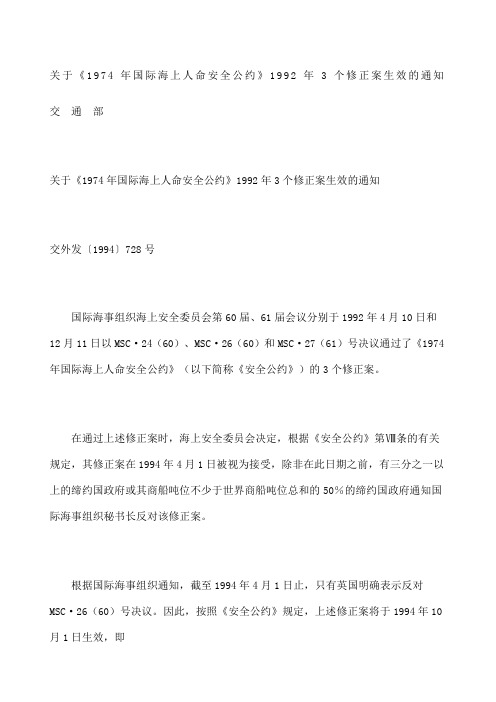
关于《1974年国际海上人命安全公约》1992年3个修正案生效的通知交通部关于《1974年国际海上人命安全公约》1992年3个修正案生效的通知交外发〔1994〕728号国际海事组织海上安全委员会第60届、61届会议分别于1992年4月10日和12月11日以MSC·24(60)、MSC·26(60)和MSC·27(61)号决议通过了《1974年国际海上人命安全公约》(以下简称《安全公约》)的3个修正案。
在通过上述修正案时,海上安全委员会决定,根据《安全公约》第Ⅷ条的有关规定,其修正案在1994年4月1日被视为接受,除非在此日期之前,有三分之一以上的缔约国政府或其商船吨位不少于世界商船吨位总和的50%的缔约国政府通知国际海事组织秘书长反对该修正案。
根据国际海事组织通知,截至1994年4月1日止,只有英国明确表示反对MSC·26(60)号决议。
因此,按照《安全公约》规定,上述修正案将于1994年10月1日生效,即从此日起,除英国对MSC·26(60)通过的修正案予以保留外,其他缔约国必须执行上述3个修正案。
我国是公约的缔约国之一,也将从此日起执行。
现将该《安全公约》修正案的中文本发给你们,请届时遵照执行。
附件:一、《1974年国际海上人命安全公约》第Ⅱ—2章修正案二、《1974年国际海上人命安全公约》第Ⅱ—Ⅰ章修正案三、《1974年国际海上人命安全公约》修正案一九九四年七月二十七日附件一:《1974年国际海上人命安全公约》第Ⅱ—2章修正案——关于现有客船的消防安全措施(于1992年4月10日以MSC·24(60)号决议通过)第1条适用范围1.将现有的第3款的编号改为3.1,并在其后补充新的3.2如下:3.2 尽管有3.1款的规定,当对载客超过36人的客船进行修理、改装、改建以及与之有关的舾装时应符合下列规定:.1 所有使用于这些船上的材料应符合对1994年10月1日或以后建造的船舶所提出的材料要求。
船舶管理的公约知识点总结
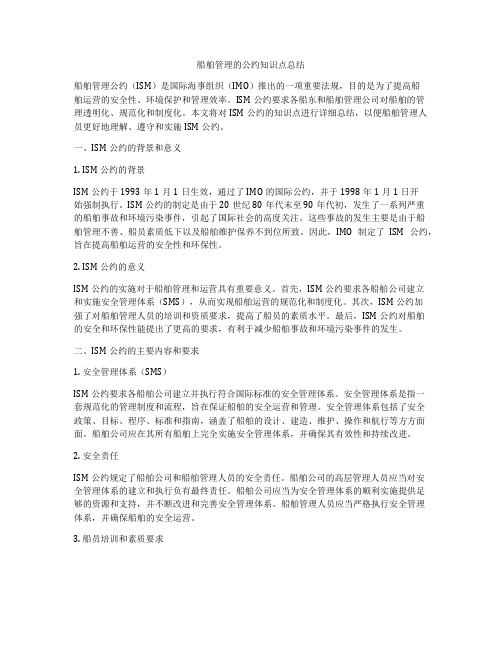
船舶管理的公约知识点总结船舶管理公约(ISM)是国际海事组织(IMO)推出的一项重要法规,目的是为了提高船舶运营的安全性、环境保护和管理效率。
ISM公约要求各船东和船舶管理公司对船舶的管理透明化、规范化和制度化。
本文将对ISM公约的知识点进行详细总结,以便船舶管理人员更好地理解、遵守和实施ISM公约。
一、ISM公约的背景和意义1. ISM公约的背景ISM公约于1993年1月1日生效,通过了IMO的国际公约,并于1998年1月1日开始强制执行。
ISM公约的制定是由于20世纪80年代末至90年代初,发生了一系列严重的船舶事故和环境污染事件,引起了国际社会的高度关注。
这些事故的发生主要是由于船舶管理不善、船员素质低下以及船舶维护保养不到位所致。
因此,IMO制定了ISM公约,旨在提高船舶运营的安全性和环保性。
2. ISM公约的意义ISM公约的实施对于船舶管理和运营具有重要意义。
首先,ISM公约要求各船舶公司建立和实施安全管理体系(SMS),从而实现船舶运营的规范化和制度化。
其次,ISM公约加强了对船舶管理人员的培训和资质要求,提高了船员的素质水平。
最后,ISM公约对船舶的安全和环保性能提出了更高的要求,有利于减少船舶事故和环境污染事件的发生。
二、ISM公约的主要内容和要求1. 安全管理体系(SMS)ISM公约要求各船舶公司建立并执行符合国际标准的安全管理体系。
安全管理体系是指一套规范化的管理制度和流程,旨在保证船舶的安全运营和管理。
安全管理体系包括了安全政策、目标、程序、标准和指南,涵盖了船舶的设计、建造、维护、操作和航行等方方面面。
船舶公司应在其所有船舶上完全实施安全管理体系,并确保其有效性和持续改进。
2. 安全责任ISM公约规定了船舶公司和船舶管理人员的安全责任。
船舶公司的高层管理人员应当对安全管理体系的建立和执行负有最终责任。
船舶公司应当为安全管理体系的顺利实施提供足够的资源和支持,并不断改进和完善安全管理体系。
国际海事动态
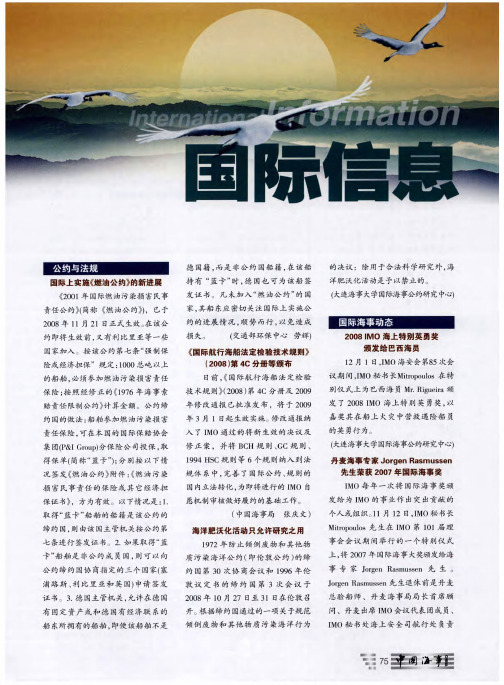
u
。
1 1 月 12 日 I M O 秘
,
书长
缔 约 国 则 由 该 国 主 管机 关 按 公 约 第
,
海 洋 肥 沃 化 活 动 只 允 许 研 究之 用
19 7 2
lo
s
先生在
IM O
一
第
10 1 届 理
条进 行 签 发 证 书
。
2
.
如 果取 得 蓝
,
“
年 防止 倾 倒 废物和其他 物
德 国 籍 而 是 非公 约 国船 籍 在 该 船
,
,
的决议
:
除 用 于 合 法 科 学研 究 外 海
,
的新 进 展 燃 国 际 上 实 施 《 油 公 约》
2 《0 () 1 年 国 际 燃 油 污 染 损 害 民 事
持有
“
蓝卡 时 德 国也 可 为该船 签
, 。
”
洋肥 沃 化 活 动 是 予 以 禁止 的
日前
,
颁 发给 巴西 海员
12
险 或 经 济担 保
,
。
规 定 :1 0 0 0 总 吨 以 上
月 1 日 I M O 海 安 会 第8 5 次 会
, ,
的 船 舶 必 须 参加 燃 油 污 染 损 害 责 任
1 保 险 ;按 照 经 修 正 的 《 9 7 6 年 海 事 索
国 《 际 航 行 海船 法 定 检 验
一
总验 船 师
问
、
、
丹 麦海 事局 局 长 首 席顾
、
有 固 定 资 产 或 和 德 国 有 经 济联 系 的
船 东所 拥 有 的 船 舶 即 便 该 船 舶 不 是
国际海事动态

国际海事International Maritime动态N ew s(编辑:张孟熹)《压载水公约》修正案正式生效10月13日,《压载水公约》(BWM)修正案正式生效,修正案确定了压载水交换标准从D-1向D-2过渡的实施时间表。
该修正案于2018年4月在IMO会议上获得通过,同时涉及检验和认证。
通常情况下,船舶通过安装压载水管理系统以达到D-2标准。
目前市场上已有许多获得认证的系统,有的采取物理方式例如紫外线来处理压载水,有的使用活性物质例如化学药品,使用活性物质的系统需要通过额外的认证程序。
到2024年9月8日前,越来越多的船舶将按照BWM公约D-2标准执行。
(编译自IMO网站)IMO召开IMO 2020和替代燃料研讨会10月17日至18日,IMO 2020和替代燃料研讨会在IMO举办,超过300名代表参加了此次研讨会,众多来自成员国政府、航运公司、炼油厂、燃油供应商和法律专家在研讨会期间发表演讲。
研讨会期间,“限硫令”带来的巨大变化和挑战再次成为航运业利益相关方关注的焦点。
IMO秘书长林基泽先生指出,自2016年确定“限硫令”实施日期以来,航运业利益相关方已为其做了大量准备工作,包括为船东以及船旗国、港口国制定的一些列指导和指南。
IMO海洋环境司司长表示,IMO 将竭尽全力推动“限硫令”的贯彻实施。
此外,与会者在研讨会的第二天还集中讨论了替代燃料在国际航运业脱碳进程中的作用。
(编译自IMO网站)IMO召开渔船条约部长级会议10月21日至23日,IMO在西班牙托雷莫里诺斯举办了渔船安全与非法、不报告、不受管制捕鱼的部长级会议,约有来自120个国家、地区的70名部长级代表和来自30个国际组织的500名代表出席了此次会议。
会议期间,48个国家、地区签署了托雷莫里诺斯宣言,公开表示要确保在《开普敦协定》通过10周年之前——即2022年10月11日之前使其生效。
《开普敦协定》的条约将在有至少22个国家或地区签署该协定,且有3 600艘长度超过24米的渔船同意接受该协定的12个月后生效。
国际海事组织公约(一)

国际海事组织公约(一)1948年国际海事组织公约CONVENTION ON THE INTERNA TIONAL MARITIME ORGANIZA TION,1948颁布日期:19480306 实施日期:19580317 颁布单位:日内瓦The States parties to the present Convention hereby establish theInternational Maritime Organization (hereinafter referred to as theOrganization )。
PART I Purposes of the OrganizationArticle 1The purposes of the Organization are:(a)To provide machinery for co-operation among Governments in thefield of governmental regulation and practices relating to technicalmatters of all kinds affecting shipping engaged in international trade;toencourage and facilitate the general adoption of the highest practicablestandards in matters concerning the maritime safety,efficiency ofnavigation and prevention and control of marine pollution from ships;andto deal with administrative and legal matters related to the purposes setout in this Article;(b)To encourage the removal of discriminatory action andunnecessaryrestrictions by Governments affecting shipping engaged in internationaltrade so as to promote the availability of shipping services to thecommerce of the world without discrimination;assistance and encouragementgiven by a Government for the development of its national shipping and forpurposes of security does not in itself constitute discrimination,provided that such assistance and encouragement is not based on measuresdesigned to restrict the freedom of shipping of all flags to take part ininternational trade;(c)To provide for the consideration by the Organization of mattersconcerning unfair restrictive practices by shipping concerns in accordancewith Part II;(d)To provide for the consideration by the Organization of anymatters concerning shipping and the effect of shipping on the marineenvironment that may be referred to it by any organ or specialized agencyof the United Nations;(e)To provide for the exchange of information among Governments onmatters under consideration by the Organization.PART II FunctionsArticle 2In order to achieve the purposes set out in Part I,the Organizationshall:(a)Subject to the provisions of Article 3,consider andmakerecommendations upon matters arising under Article 1 (a),(b)and (c)thatmay be remitted to it by Members,by any organ or specialized agency ofthe United Nations or by any other intergovernmental organization or uponmatters referred to it under Article 1 (d);(b)Provide for the drafting of conventions,agreements,or othersuitable instruments,and recommend these to Governments and tointergovernmental organizations,and convene such conferences as may benecessary;(c)Provide machinery for consultation among Members and the exchangeof information among Governments;(d)Perform functions arising in connexion with paragraphs (a),(b)and (c)of this Article,in particular those assigned to it by or underinternational instruments relating to maritime matters and the effect ofshipping on the marine environment;(e)Facilitate as necessary,and in accordance with Part X,technicalco-operation within the scope of the Organization.Article 3In those matters which appear to the Organization capable ofsettlement through the normal processes of international shipping businessthe Organization shall so recommend. When,in the opinion of theOrganization,any matter concerning unfair restrictive practicesbyshipping concerns is incapable of settlement through the normal processesof international shipping business,or has in fact so proved,and providedit shall first have been the subject of direct negotiations between theMembers concerned,the Organization shall,at the request of one of thoseMembers,consider the matter.PART III MembershipArticle 4Membership in the Organization shall be open to all States,subject tothe provisions of Part III.Article 5Members of the United Nations may become Members of the Organizationby becoming parties to the Convention in accordance with the provisions ofArticle 71.Article 6States not Members of the United Nations which have been invited tosend representatives to the United Nations Maritime Conference convened inGeneva on 19 February 1948,may become Members by becoming parties to theConvention in accordance with the provisions of Article 71.Article 7Any State not entitled to become a Member under Article 5 or 6 mayapply through the Secretary-General of the Organization to become aMemberand shall be admitted as a Member upon its becoming a party to theConvention in accordance with the provisions of Article 71 provided that,upon the recommendation of the Council,its application has been approvedby two-thirds of the Members other than Associate Members.Article 8Any Territory or group of Territories to which the Convention has beenmade applicable under Article 72,by the Member having responsibility forits international relations or by the United Nations,may become anAssociate Member of the Organization by notification in writing given bysuch Member or by the United Nations,as the case may be,to the SecretaryGeneral of the United Nations.Article 9An Associate Member shall have the rights and obligations of a Memberunder the Convention except that it shall not have the right to vote or beeligible for membership on the Council and subject to this the word Member in the Convention shall be deemed to include Associate Memberunless the context otherwise requires.Article 10No State or Territory may become or remain a Member of theOrganization contrary to a resolution of the General Assembly of theUnited Nations.PART IV OrgansArticle 11The Organization shall consist of an Assembly, a Council, a MaritimeSafety Committee, a Legal Committee, a Marine Environment ProtectionCommittee, a Technical Co-operation Committee and such subsidiary organsas the Organization may at any time consider necessary;and aSecretariat.PART V The AssemblyArticle 12The Assembly shall consist of all the Members.Article 13Regular sessions of the Assembly shall take place once every twoyears. Extraordinary sessions shall be convened after a notice of sixtydays whenever one-third of the Members give notice to theSecretary-General that they desire a session to be arranged,or at anytime if deemed necessary by the Council,after a notice of sixty days.Article 14A majority of the Members other than Associate Members shallconstitute a quorum for the meetings of the Assembly.Article 15The functions of the Assembly shall be:(a)To elect at each regular session from among its Members,otherthan Associate Members,its President and two Vice-Presidents who shallhold office until the next regular session;(b)To determine its own Rules of Procedure except as otherwiseprovided in the Convention;(c)To establish any temporary or,upon recommendation of the Council,permanent subsidiary bodies it may consider to be necessary;(d)To elect the Members to be represented on the Council as providedin Article 17;(e)To receive and consider the reports of the Council,and to decideupon any question referred to it by the Council;(f)To approve the work programme of the Organization;(g)To vote the budget and determine the financial arrangements of theOrganization,in accordance with Part XII;(h)To review the expenditures and approve the accounts of theOrganization;(i)To perform the functions of the Organization,provided that inmatters relating to Article 2 (a)and (b),the Assembly shall refer suchmatters to the Council for formulation by it of any recommendations orinstruments thereon;provided further that any recommendations orinstruments submitted to the Assembly by the Council and not accepted bythe Assembly shall be referred back to the Council for furtherconsideration with such observations as the Assembly may make;(j)To recommend to Members for adoption regulations and guidelinesconcerning maritime safety,the prevention and control ofmarine pollutionfrom ships and other matters concerning the effect of shipping on themarine environment assigned to the Organization by or under internationalinstruments,or amendments to such regulations and guidelines which havebeen referred to it;(k)To take such action as it may deem appropriate to promotetechnical co-operation in accordance with Article 2 (e),taking intoaccount the special needs of developing countries;(l)To take decisions in regard to convening any internationalconference or following any other appropriate procedure for the adoptionof international conventions or of amendments to any internationalconventions which have been developed by the Maritime Safety Committee,the Legal Committee,the Marine Environment Protection Committee,theTechnical Co-operation Committee,or other organs of the Organization.(m)To refer to the Council for consideration or decision any matterswithin the scope of the Organization,except that the function of makingrecommendations under paragraph (j)of this Article shall not bedelegated.PART VI The CouncilArticle 16The Council shall be composed of thirty-two Members elected by theAssembly.Article 17In electing the Members of the Council,the Assembly shall observe thefollowing criteria:(a)Eight shall be States with the largest interest in providinginternational shipping services;(b)Eight shall be other States with the largest interest ininternational seaborne trade;(c)Sixteen shall be States not elected under (a)or (b)above whichhave special interests in maritime transport or navigation,and whoseelection to the Council will ensure the representation of all majorgeographic areas of the world.Article 18Members represented on the Council in accordance with Article 16 shallhold office until the end of the next regular session of the Assembly.Members shall be eligible for re-election.Article 19(a)The Council shall elect its Chairman and adopt its own Rules ofProcedure except as otherwise provided in the Convention.(b)Twenty-one Members of the Council shall constitute a quorum. (c)The Council shall me et upon one month’s notice as often as may benecessary for the efficient discharge of its duties upon the summons ofits Chairman or upon request by not less than four of its Members.Itshall meet at such places as may be convenient.Article 20The Council shall invite any Member to participate,without vote,inits deliberations on any matter of particular concern to that Member.Article 21(a)The Council shall consider the draft work programme and budgetestimates prepared by the Secretary-General in the light of the proposalsof the Maritime Safety Committee,the Legal Committee,the MarineEnvironment Protection Committee,the Technical Co-operation Committee andother organs of the Organization and,taking these into account,shallestablish and submit to the Assembly the work programme and budget of theOrganization,having regard to the general interest and priorities of theOrganization.(b)The Council shall receive the reports,proposals andrecommendations of the Maritime Safety Committee,the Legal Committee,theMarine Environment Protection Committee,the Technical Co-operationCommittee and other organs of the Organization and shall transmit them tothe Assembly and,when the Assembly is not in session,to the Members forinformation,together with the comments and recommendations of theCouncil.(c)Matters within the scope of Articles 28,33,38 and 43 shall beconsidered by the Council only after obtaining the views of theMaritimeSafety Committee,the Legal Committee,the Marine Environment ProtectionCommittee,or the Technical Co-operation Committee,as may beappropriate.Article 22The Council,with the approval of the Assembly,shall appoint theSecretary-General. The Council shall also make provision for theappointment of such other personnel as may be necessary,and determine theterms and conditions of service of the Secretary-General and otherpersonnel,which terms and conditions shall conform as far as possiblewith those of the United Nations and its specialized agencies.Article 23The Council shall make a report to the Assembly at each regularsession on the work performed by the Organization since the previousregular session of the Assembly.Article 24The Council shall submit to the Assembly financial statements of theOrganization,together with the Council’s comments and recommendations.Article 25(a)The Council may enter into agreements or arrangements covering therelationship of the Organization with other organizations,as provided forin Part XV. Such agreements or arrangements shall be subject toapprovalby the Assembly.(b)Having regard to the provisions of Part XV and to the relationsmaintained with other bodies by the respective Committees under Articles28,33,38 and 43,the Council shall,between sessions of the Assembly,beresponsible for relations with other organizations. Article 26Between sessions of the Assembly,the Council shall perform all thefunctions of the Organization,except the function of makingrecommendations under Article 15 (j)。
1978stcw公约马尼拉附则

第VI章 关于应急、职业安全、医护和救生职能的指导;
第VII章 关于可供选择的发证的指导;
第VIII章 关于值班的指导;
2.马尼拉修正案产生的背景 船舶向大型化、快速化、专业化、现代化的方向发展; 海洋环境保护更加严格; IT技术应用越来越广泛; 海盗猖獗,对船员提出保安要求; STCW78/95实施10年,需要全面回顾。
国际海事组织海上安全委员会设立一个培训与值班分 委员会,为培训海员使用助航设施、救生设备、消防设备 等草拟了《1964年指南文件》,并于1975年和1977年对此 文件进行修正和增补,直至起草公约草案。
国际海事组织于1978年6月14日至7月7日在伦敦召开 了外交大会,制定并通过了《1978年海员培训、发证和值 班标准国际公约》。该公约于 1983年4月27日达到了生效 条件,按公约规定: 该公约于1984年4月28日生效。我国 于1981年6月8日加入该公约,根据公约规定,该公约于 1984年4月28日起开始对我国生效。
修改的主要内容:
新增“适任证书”、“培训合格证书”、“书面证明”、 “电子员”、“电子技工”、“高级值班水手”、“高级值 班机工”、“保安职责”等新定义。
为适应海上运输保安的需要,增设船舶保安方面的强制性培 训要求;
新增证书的签发和登记条款,对海上服务资历的认可,培训 课程的确认,登记的电子查询,证书注册数据库的开发等规 定;
新增STCW规则,其中A部分为强制性标准;B部分为建议 指导
正文 同原公约 附则 第I章 总则; 第II章 船长和甲板部; 第III章 轮机部; 第IV章 无线电通信和无线电人员; 第V章 特定类型船舶的船员特殊培训要求; 第VI章 应急、职业安全、医护和救生职能; 第VII章 可供选择的发证;
1978年海员培训、发证和值班标准国际公约

1978年海员培训、发证和值班标准国际公约1978年海员培训、发证和值班标准国际公约(STCW公约)是一项由国际海事组织(IMO)制定的重要条约,旨在加强全球海员培训和发证体系,提高海员的技能水平和安全意识,从而保障航海安全和海员生命财产安全。
本文将从STCW公约的历史背景、主要内容和实施效果等方面进行详细介绍。
1.历史背景STCW公约的制定是由于上世纪70年代发生的一系列严重海上事故,这些事故揭示出海员技能水平低下、培训不足以及海员值班标准不统一等问题,严重威胁了船舶和海员的安全。
为了解决这些问题,国际海事组织于1978年在伦敦召开了国际海员培训、发证和值班标准会议,并最终通过了STCW公约,从而确立了全球性的海员培训和发证标准,为全球航运业的发展和安全奠定了基础。
2.主要内容STCW公约的主要内容包括海员的基本培训、高级培训、值班标准和证书的颁发等方面,具体如下:(1)海员的基本培训:STCW公约规定了海员在上船前必须接受的基本培训内容,包括个人安全与社会责任、防火和基础急救等方面的知识和技能培训,以确保海员具备必要的安全意识和基本技能。
(2)海员的高级培训:针对特定职位的海员,STCW公约规定了更为专业和深入的高级培训要求,包括航海技术、机械工程、电子通信等方面的专业知识和技能培训,以提升海员的专业水平和工作能力。
(3)海员值班标准:STCW公约规定了海员在值班时应遵循的标准和程序,包括航行中的安全管理、航行监督和应急处置等方面的要求,以保障船舶的安全运行和乘员的生命财产安全。
(4)证书的颁发:STCW公约规定了海员证书的颁发标准和程序,确保海员在取得证书后能够胜任相应的工作岗位,并持续接受相关培训和检定,以保证海员的技能和知识水平符合国际标准。
3.实施效果STCW公约的实施对全球航运业和海员的发展产生了积极影响,具体体现在以下几个方面:(1)提高了海员的技能水平:STCW公约规定了海员必须接受基本和高级的培训,从根本上提高了海员的技能水平和专业素质,使其能够胜任复杂的海上工作。
经修正的《1974年国际海上人命安全公约》修正案(MSC.170(79))
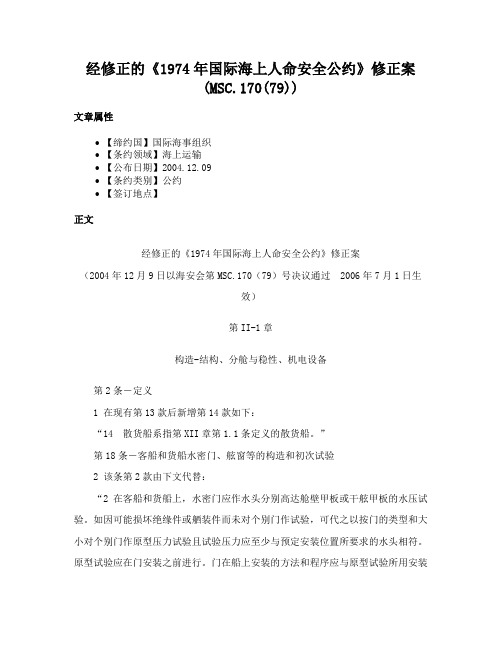
经修正的《1974年国际海上人命安全公约》修正案(MSC.170(79))文章属性•【缔约国】国际海事组织•【条约领域】海上运输•【公布日期】2004.12.09•【条约类别】公约•【签订地点】正文经修正的《1974年国际海上人命安全公约》修正案(2004年12月9日以海安会第MSC.170(79)号决议通过2006年7月1日生效)第II-1章构造-结构、分舱与稳性、机电设备第2条-定义1 在现有第13款后新增第14款如下:“14散货船系指第XII章第1.1条定义的散货船。
”第18条-客船和货船水密门、舷窗等的构造和初次试验2 该条第2款由下文代替:“2 在客船和货船上,水密门应作水头分别高达舱壁甲板或干舷甲板的水压试验。
如因可能损坏绝缘件或舾装件而未对个别门作试验,可代之以按门的类型和大小对个别门作原型压力试验且试验压力应至少与预定安装位置所要求的水头相符。
原型试验应在门安装之前进行。
门在船上安装的方法和程序应与原型试验所用安装方法和程序相符。
每扇门在船上装好后,应检查其是否在舱壁和门框之间正确就位。
”第45条-触电、电气火灾及其他电气灾害的预防措施3 在标题后增加以下文字:“(本条第10和11款适用于2007年1月1日后建造的船舶)”。
4 现有第10款由下文代替:“10电气设备不应安装在任何可燃混合物气体易于积聚的处所内,例如,主要用于储存蓄电池的舱室、油漆间、乙炔储藏室或类似处所,除非主管机关认为,这些设备:.1 是操作所必需的;.2 属于不会点燃有关混合物气体的类型;.3 适合于相关处所;和.4 经适当证明在可能遇到的尘土、蒸汽或气体中使用是安全的。
”5 在经修正的第10款之后增加新的第11款如下:“11在液货船上,电气设备、电缆和电线不得安装在危险场所,除非它符合不低于本组织接受的标准(注:参考国际电工委员会出版的标准,IEC60092-502:1999‘船舶电气装置-液货船’。
)?”。
海上航行 国际公约

海上航行国际公约1. 引言海上航行国际公约(The International Convention for the Safety of Life at Sea,简称SOLAS公约)是一项关于海事安全的国际公约。
该公约为国际海上航行提供了一系列的标准和规定,以确保船舶和船员的安全。
本文将对SOLAS公约的背景、重要性和实施情况进行全面深入的探讨。
2. 背景海上航行是国际贸易和人员运输的重要方式之一。
然而,由于海上航行曾经发生过大量的船舶事故,导致数以千计的生命丧失和巨额财产损失。
因此,国际社会迫切需要一个旨在确保海上航行安全的国际公约。
3. SOLAS公约的制定和发展SOLAS公约最早于1914年由国际海事组织(IMO)提出,旨在制定一套全球性的航行安全标准。
公约随后多次修订,最新的一次修订于1974年,并于1980年正式生效。
SOLAS公约目前已经被全球绝大多数国家所接受和实施。
4. SOLAS公约的内容SOLAS公约涵盖了船舶设计、建造、装备和操作等多个方面,旨在保证船舶和船员的安全。
其主要内容包括但不限于以下几个方面:4.1 船舶结构和装备标准SOLAS公约要求船舶必须符合特定结构和装备标准,以确保其稳定性和安全性。
例如,船舶必须具有防火装置、逃生设备、通信设备等。
4.2 船员培训和规范SOLAS公约规定了船员的培训要求和工作规范,以提高他们处理紧急情况的能力和水平。
船员必须经过专业训练,并拥有相应的资质证书。
4.3 船舶检验和认证SOLAS公约要求船舶必须定期接受检验和认证,以确保其符合安全标准。
这些检验包括对船舶的结构、设备、消防系统等进行全面检查。
4.4 航行安全管理系统SOLAS公约鼓励船东和船舶经营者建立航行安全管理系统(SMS),以确保船舶在日常运营中始终符合安全标准。
SMS包括风险评估、紧急情况应对措施等方面的内容。
5. SOLAS公约的重要性和影响SOLAS公约的实施对于保障海上航行安全具有重要意义。
2014年世界海事日国际海事组织公约:有效实施背景文件

2014年世界海事日国际海事组织公约:有效实施背景文件多年来,国际海事组织在制订和通过新的国际公约上,已建立了令人羡慕的业绩记录。
总共有约53个公约。
它们的共同目的或者在于预防事故、海难或环境损害;在于减少事故发生时的负面影响,或者在于确立一种机制以保证遭受事故后果的人员能获得足够的赔偿。
虽然这些公约的大多数已经生效并为使航运更安全、更高效和环境更友好做出很大贡献,但仍然有几个公约因其批准进程缓慢而没有实施,因此引起担忧。
毫无疑问,在此方面,我们可以,也确实必须,做更多的工作。
通过一项海事组织的公约,可能感觉就象一个过程的结束。
召开一次会议,商定一个文本,全场击掌欢庆。
但这不该是该过程的终点。
确实,通过一项公约,应该仅仅是开始的结束,因为只有得到有效和全面的实施,一项海事组织公约才有价值。
除非对最后结果有实际影响,否则所有那些花费在润色条文上的成百甚至上千的工时,所有那些已吸取的技术专家意见,所有那些研究及所有调查都将毫无价值。
为此,公约的批准、广泛生效及有效实施都必不可少。
选择2014年世界海事日主题‒即“国际海事组织公约:有效实施”时,想到了这一点。
这一主题提供了一个机会,聚焦于那些尚未生效的海事组织文书,以及更多的国家批准和更加有效的实施将带来极大益处的那些文书。
在2014年伊始宣布这个主题时,国际海事组织秘书长Koji Sekimizu提出了一系列反问:如一项公约不能生效,那么为制订和通过该国际公约而工作数月甚至数年究竟是为了什么?如一项文书不能成为国际法律体系的一部分,那么为制订这一能普遍通过的文书而进行的所有需要的技术工作、辩论与讨论、谈判与妥协究竟是为了什么?当然,答案是,没有什么意义。
他说,就象写一本没人读的书,或拍一部没人看的电影一样。
对于海事组织的公约,它仅是完成了一半的工作‒实际上不到一半。
海事组织的公约要行之有效,它需要及早生效、广泛批准、有效实施、严格的监督遵约和有力执行。
3第三章 国际海事公约详解
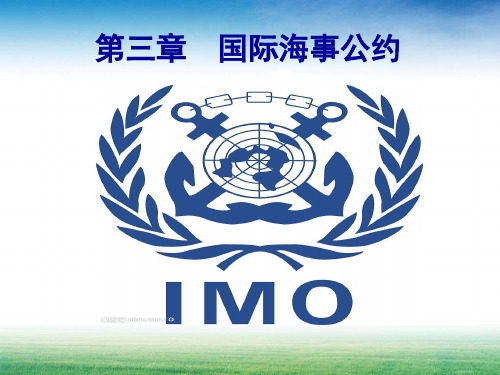
各舱室和甲板出入通道的细节以及通风系统。控制图的说明 应用船旗国官方文字及英(法)文书写,如有改动,应尽可
能立即更正。所有船上的应有1套防火控制图或具有该图的
小册子的复制品,永久性地置于甲板室外面有醒目标志的风
雨密盒子里,以有助于岸上消防人员取用。
能获得新证书,原证书可展期不超过5个月。
(7)证书失效时船舶不在其接受检验的港口时, 可延长证书的有效期让其完成驶往检验港口
的航次,展期不得超过3个月,船舶抵达后
必须换妥新证书方可驶离
三、构 造
1. 驾驶台对推进机器的控制 2. 驾驶台与机器处所之间的通信 3. 应急电源 4. 破损控制资料 5. 稳性资料 6. 货船破舱稳性控制 7. 水密装置的关闭操作
(2)货船救生设备和其他设备的检验:
① 初次检验:在船舶投入营运前进行;
② 换新检验:间隔期不超过5年; ③ 年度检验:在货船设备安全证书的每一周年日
之前或之后3个月内进行; ④ 定期检验:在货船设备安全证书的第2个或第3
个周年日之前或之后3个月内进行,
该检验应替代1次年度检验; ⑤ 附加检验:视情况进行
3、适用范围
SOLAS74公约仅适用于从事于国际航行的 船舶,但不适用于500总吨以下的货船、军 用舰艇和运兵船、非机动船、制造简陋的 木船、非营业性的游艇和渔船。
二、船舶的检验与证书
1.检验种类 (1)客船应接受下列检验:
①初次检验:在船舶投入营运前进行; ②换新检验:每12个月进行一次;
③附加检验:视情况进行
2、公约的构架
SOLAS公约的结构为:公约正文条款、1988年议定书 条款、公约附则、公约附件、附属于公约单项规则。 其核心部分是公约的附则,它规定了与安全密切相 关的船舶构造、设备及其操作的最低安全标准,由 各缔约国强制执行;船员考试中涉及的所谓“SOLAS 公约”的内容,均是指公约附则的内容而非指公约 正文的内容,公约附则共分为十二章(详见课本39 页)
相关国际海事公约的产生及发展规律

相关国际海事公约的产生及发展规律
范育军
【期刊名称】《中国海事》
【年(卷),期】2012(000)010
【总页数】2页(P55-56)
【作者】范育军
【作者单位】南通航运职业技术学院
【正文语种】中文
【相关文献】
1.国际海事公约与国际海事组织 [J],
2.国际海事组织法律委员会产生的公约和其他法律文件清单 [J], 宋巍
3.纽马克翻译理论视域下国际海事公约中
模糊限制语的汉译技巧及语用功能 [J], 黄超夷
4.关于实施即将生效的国际海事组织(IMO)有关国际航行海船的救生设备的公约修正案、强制性规则修正案及相关文件的通知 [J],
5.继STCW公约马尼拉修正案之后,国际海事组织又开始修订STCW公约 [J],因版权原因,仅展示原文概要,查看原文内容请购买。
bwm2004公约

bwm2004公约bwm2004公约是指国际海事组织(IMO)于2004年通过的《船舶船用垃圾和污水管理规则公约》。
该公约的目的是保护海洋环境,通过规范船舶船用垃圾和污水的管理,减少对海洋的污染。
垃圾和污水是船舶在航行中产生的主要废弃物。
船舶在海上航行时,会产生各种垃圾,包括塑料、玻璃、金属、纸张、食物残渣等。
船舶还会产生黑水(含有人类排泄物的污水)、灰水(包括洗涤水、厨房排水等)和厨余垃圾。
这些废弃物如果不经过适当的处理和处置,将会对海洋环境产生严重的污染。
bwm2004公约的主要内容包括船舶船用垃圾管理规则和船舶船用污水管理规则。
根据公约规定,船舶需要将垃圾储存在船上的垃圾舱内,并在到达港口时将垃圾交由专门的处理机构处置。
垃圾包括塑料、纸张、金属、废弃物和残渣等。
船舶还需要配备适当的垃圾处理设备,如压碎机、焚烧炉等,以便在海上处理垃圾。
至于船舶船用污水管理规则,根据公约规定,船舶需要将黑水和灰水储存在专用的污水舱内,并在到达港口时将污水交由专门的处理机构处置。
船舶需要配备适当的污水处理设备,如生物反应器、沉淀池等,以便在船上处理污水。
公约还规定了船舶船用污水的排放标准,船舶在特定的区域需要将污水处理至一定水平后才能排放。
为了确保船舶船用垃圾和污水的管理得到有效的执行,bwm2004公约还规定了各国的执法责任和监督机制。
各国需要建立相应的法律法规,对船舶的垃圾和污水管理进行监督,并对违反公约规定的船舶进行处罚。
此外,公约还鼓励船舶运营者采用先进的垃圾和污水处理技术,以进一步减少对海洋的污染。
bwm2004公约的实施对于保护海洋环境具有重要意义。
船舶作为重要的国际运输工具,其垃圾和污水的管理直接影响到海洋生态系统的健康和可持续发展。
通过严格执行公约的规定,可以减少船舶对海洋的污染,保护海洋的生物多样性,维护海洋生态平衡。
然而,尽管bwm2004公约的规定已经得到了国际认可,但是在实际执行过程中仍然存在一些挑战。
- 1、下载文档前请自行甄别文档内容的完整性,平台不提供额外的编辑、内容补充、找答案等附加服务。
- 2、"仅部分预览"的文档,不可在线预览部分如存在完整性等问题,可反馈申请退款(可完整预览的文档不适用该条件!)。
- 3、如文档侵犯您的权益,请联系客服反馈,我们会尽快为您处理(人工客服工作时间:9:00-18:30)。
02:00 8
3、联合国海洋法公约
3.每个国家对悬挂该国旗帜的船舶,除其他外,应就下列各项采取为保 证海上安全所必要的措施: (a)船舶的构造、装备和适航条件; (b)船舶的人员配备、船员的劳动条件和训练,同时考虑到适用的 国际文件; (c)信号的使用、通信的维持和碰撞的防止。 4.这种措施应包括为确保下列事项所必要的措施: (a)每艘船舶,在登记前及其后适当的间隔期间,受合格的船舶检 验人的检查,并在船上备有船舶安全航行所需要的海图、航海出版物以 及航行装备和仪器; (b)每艘船舶都由具备适当资格,特别是具备航海术、航行、通信 和海洋工程等方面资格的船长和高级船员负责,而且船员的资格和人数 与船舶种类、大小、机械和装备都是相称的; (c)船长、高级船员和在适当范围内的船员,充分熟悉并须遵守关 于海上生命安全,防止碰撞,防止、减少和控制海洋污染和维持无线电 02:00 9 通信所适用的国际规章。
7
3、联合国海洋法公约
第94条 船旗国的义务 1.每个国家应对悬挂该国旗帜的船舶有效地行使行政 、技术及社会事项上的管辖和控制。 2.每个国家特别应: (a)保持一本船舶登记册,载列悬挂该国旗帜的船 舶的名称和详细情况,但因体积过小而不在一般接受的 国际规章规定范围内的船舶除外; (b)根据其国内法,就有关每艘悬挂该国旗帜的船 舶的行政、技术和社会事项,对该船及其船长、高级船 员和船员行使管辖权。
Article 66 Procedures for judicial settlement, arbitration(仲裁) and conciliation(调解 ) If, under paragraph 3 of article 65, no solution has been reached within a period of 12 months following the date on which the objection was raised, the following procedures shall be followed: (a) any one of the parties to a dispute concerning the application or the interpretation of article 53 or 64 may, by a written application, submit it to the International Court of Justice for a decision unless the parties by common consent agree to submit the dispute to arbitration;
2006年海事劳工公约
海上安全 防污染
责任与赔偿
其他
02:00
3
2、维也纳条约法公约 Vienna Convention on the Law o9年5月23日召开的维也纳外交大会上通过。公约共8篇85条,包括条约的缔结 与生效,条约的遵守,适用及解释,条约的修正与修改,条约的失效与终止,条 约的保管与登记等,是各国在缔结、参加和实施国际条约的过程中所应遵循的一 个最基本的国际法文件。 《公约》于1980年1月27日生效。中国于1997年9月3 日交存加入书,于1997年10 月3日对中国生效,对《公约》六十六条持有保留,并宣布台湾1970年4月27日的 签署非法、无效。
“third State” means a State not a party to the treaty;
02:00
5
2、维也纳条约法公约 Vienna Convention on the Law of Treaty
Article 26 “Pacta sunt servanda” (契约必须遵守的原则) Every treaty in force is binding upon the parties to it and must be performed by them in good faith.
02:00
6
3、联合国海洋法公约
1973年 12月,第三次海洋法会议在纽约开幕,该次会议历时 9年,终于 于 1982 年在牙买加会议上通过了《联合国海洋法公约》。于 1994 年 11 月 16日正式生效。我国于1996年5月15日批准《公约》。交存批准书后第30 天起对我国生效。
02:00
02:00 4
2、维也纳条约法公约 Vienna Convention on the Law of Treaty
“contracting State” means a State which has consented to be bound by the treaty, whether or not the treaty has entered into force; “party” means a State which has consented to be bound by the treaty and for which the treaty is in force;
国际海事公约动态
范 耀 天 武汉理工大学航运学院
02:00
1
主要内容
1、公约体系的架构 2、维也纳条约法公约 3、联合国海洋法公约 4、IMO公约 5、2006年海事劳工公约 6、未来发展
02:00
2
1、公约体系的架构
维也纳条约法公约 联合国海洋法公约 ILO公约
IMO公约
